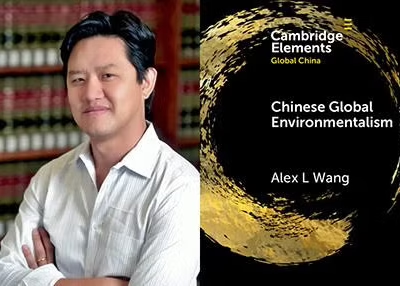A Hidden Property Gem From Justice Jackson
Where Do Property Rights Come From?
 Although it is never fun to do new class preparation, I like teaching new classes because it
Although it is never fun to do new class preparation, I like teaching new classes because it forces me gives me the opportunity to learn new material and new areas of law. So it is this semester, when I will teach water law for the first time. In this case, not only have I learned a new subject matter, but discovered a hidden gem of property law, which I usually teach.
Not surprisingly, it comes from Justice Robert Jackson, whom I regard as the best writer to have ever served on the high court. Think about it: whose majority opinions do you think are the more elegantly written? Many people say Cardozo, but I find his torts opinions obscure more than they illuminate. It’s comparative easy to write a dissent, because you can just poke holes in the majority theory, or in the case of someone like Scalia, simply ignore opposing arguments altogether (and then say it is “astonishing” that anyone could disagree with you). No – when you are writing a majority opinion you have to cobble together the votes while still being clear enough. That’s hard. And no one did it better than Jackson.
The case is United States v. Willow River Power Co., 324 U.S. 499 (1945) which concerns the federal government’s servitude over navigable rivers. In this case, the federal government constructed a dam on the Mississippi River, which backed up the water onto a tributary river, reducing the ability of the tributary to produce hydroelectric power for the plaintiff’s own dam. It sued for a taking. The Court held 7-2 that there was no taking.
But the case stands out as much for the clarity of Justice Jackson’s language than anything else:
It is clear, of course, that a head of water has value, and that the Company has an economic interest in keeping the [tributary] at the lower level. But not all economic interests are “property rights;” only those economic advantages are “rights” which have the law back of them, and only when they are so recognized may courts compel others to forbear from interfering with them or to compensate for their invasion. The law long has recognized that the right of ownership in land may carry with it a legal right to enjoy some benefits from adjacent waters. But that a closed catalogue of abstract and absolute “property rights” in water hovers over a given piece of shore land good against all the world is not, in this day, a permissible assumption. We cannot start the process of decision by calling such a claim as we have here a “property right;” whether it is a property right is really the question to be answered. Such economic uses are rights only when they are legally protected interests.
As soon as I read this paragraph, I wanted to assign it to every first year property student. I’m not sure as clear a statement of legal realism or positivism has ever been made. It represents the true nature of rhetoric: clarifying an issue instead of obscuring it.
Jackson goes farther. The plaintiff had cited a previous case suggesting that there was a taking, but in that case, Jackson pointed out, the damage occurred on a non-navigable stream, where it was suggested no federal sevitude existed; here, the plaintiff’s dam was on a navigable stream, where one clearly did exist. One right, he noted, does create another:
Rights, property or otherwise, which are absolute against all the world are certainly rare, and water rights are not among them. Whatever rights may be as between equals such as riparian owners, they are not the measure of riparian rights on a navigable stream relative to the function of the Government in improving navigation. Where these interests conflict, they are not to be reconciled as between equals, but the private interest must give way to a superior right, or perhaps it would be more accurate to say that, as against the Government, such private interest is not a right at all.
Whether or not one agrees with Jackson’s conclusion (I do), you have to admire the honesty of his presentation, as well as his ability to set forth the principle that one may have a right against Part A and not against Party B — a principle often ascribed to International News Service v. Associated Press, but actually stated more clearly here.
Perhaps getting into the details of the federal navigational servitude is too deep in the weeds (or the bulrushes) for first-year students, but Jackson’s clarity is really nice to see, especially in comparison to the tangled pomposity of Anthony Kennedy.
Reader Comments
5 Replies to “A Hidden Property Gem From Justice Jackson”
Comments are closed.







Jonathan, keep going on Justice Jackson till you get to United States v. Gerlach Live Stock Co. An elegant summary of California water law and history, but of course written from a riparian perspective befitting his Upstate origins. The paradox is that he (quite consciously) decided the case by “venturing into local [i.e. California] law”, which is completely out of order, and turned out substantively wrong on that score in light of the California Supreme Court’s subsequent ruling in Joslin v. Marin Municipal Water Dist. Still he reached a statesmanlike resolution that ducked the constitutionality of then article 14 section 3.
Have a good class at UCLA, a wish from your predecessor about 28
years back.
Tony, it’s not clear to me why you think that his venturing into California law was “completely out of order.” As I understand the case, the Court held that the Central Valley Project was governed by the Reclamation Act, which meant that the navigational servitude did not apply, and the Reclamation Act’s provisions respecting state common-law rights did. If that was the case, then the Court HAD to determine whether under local law, the riparian owners had property rights in former overflow of the San Joaquin River that could be subject to a Taking. They really didn’t have any other choice. I suppose that they could have certified it, but even Frankfurter, who makes me nauseous with his constant assertions of “Our Federalism,” didn’t argue for that. Whether Jackson got it “wrong” in light of a subsequent California Supreme Court decision depends upon your theory of law. As a wise Supreme Court justice said of his court, “we are not final because we are infallible — we are infallible because we are final.” That Justice, of course, was Robert H. Jackson.
What am I missing here?
Professor Zasloff said:
“…..So it is this semester, when I will teach water law for the first time….”
Dear Professor Zasloff,
I have a question regarding water law: Are isolated wetlands subject to federal jurisdiction under Section 404 of the Clean Water Act?
There are 18 posts on this website concerning Rapanos. You should feel free to look at them.
Joe Sax sometimes described Willow River Power as one of his favorite cases, largely, I think, because of the language you’ve quoted.